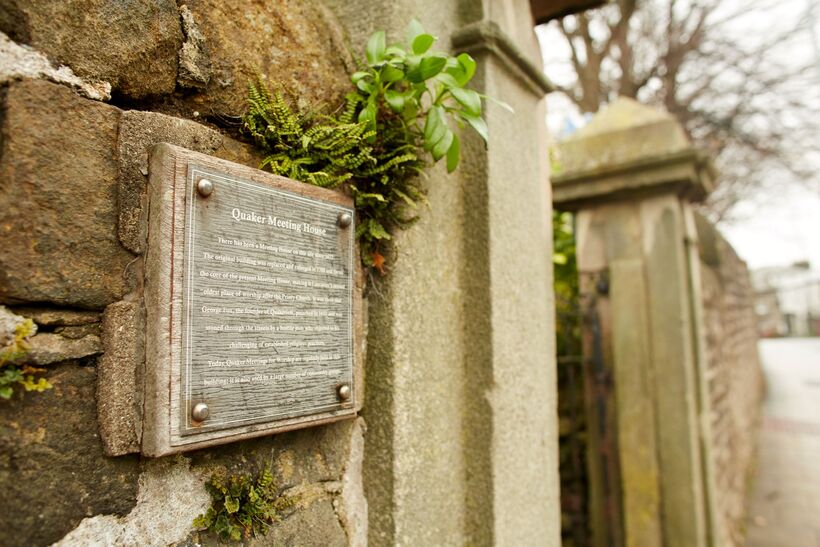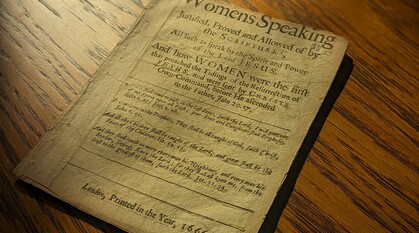Meeting houses: necessity... or luxury?
In this guest blog, Antonia Swinson, CEO of the Ethical Property Foundation, reflects on what role Quaker meeting houses play in Quaker life and whether we can afford them.

There is nothing more gut wrenching for a Friend than seeing a For Sale sign outside a meeting house. It makes us both sad and mad. Yet too often, the real reason for the sell-off is not money or even demographics, but poor property management – usually by Mr Nobody, whom we all know is the worst property manager on the planet….
Despite George Fox railing against 'steeple houses', I know I am not alone in believing that meeting houses are one of the glories of Quakerism. Years of gathered prayer and stillness, somehow seep out of the walls to strengthen us. And yet, it is a thoroughly unspiritual lack of seeking and taking advice, the lack of basic maintenance and, too often, personal conflict which threaten so many. It then only takes an accountant to look at the numbers and then curtains.
The simple truth as we head into Q2 of this century, is we are going to have to work very hard indeed to keep any of our meeting houses. I run the Ethical Property Foundation, the leading UK property advice charity serving the voluntary sector. My chartered surveyor colleagues have advised on so many Quaker properties over the years, only to see their advice ignored, because it would involve paying a fundraiser to get capital funding or letting out the spacious warden's flat for a commercial rent.
Property care needs method, vision and momentum. And just as people now walk away from neglected badly run office buildings to work online, so they run a mile from grim, draughty, paint-peeling meeting houses. And cheap fixes can be fatal. Some Friends recently told me that they were getting a quinquennial survey from a local builder for a few quid. It never occurred to them that this could be entryism to get hold of the land. Vested interests are currently prowling round faith properties, and the higher the land values the more they drool. We need to be on our guard and up to speed.
Bottom line: meeting houses are a burden when they are badly managed, and their use is not sufficiently monetised. At this point, they are also an unaffordable luxury. A well-run meeting house however is a jewel, a joy, and a complete necessity for the practice of our faith. The choice is ours: wake up and wise up or lose the lot.
Top tips for Meeting House Premises Committees
- Identify one person responsible for specific property matters and define what those matters are. Know how and why you use property; its purpose, especially if it has (potential for) multiple uses.
- Check what your local accountabilities are and what the owner is responsible for (whether your area meeting or another body)
- Know what your property is: heritage asset (local or national), listed, any covenants, restrictions on use, planning status, etc. Know its monetary value; do you need it for accountancy purposes. Is it an asset or liability?
- Know where all property papers are e.g. Land Registry title or lease. If a lease, know where it is kept and be aware of all its terms and your obligations.
- Plan for both present and future. Prepare an annual and/or several years budget to include rent and rates, repair and decoration costs, replacement costs (such as heating source), servicing costs (of building and grounds), waste charges or septic tank maintenance. Know both expenditure and income.
- Carry out regular inspections, do repairs when identified, do the requisite servicing of the property (such as boiler, electrics, solar panels, heat pumps), check security arrangements, have a cleaning rota, know what items of value (fixtures and fitting) you have, listed with photographs and where they are kept. Inspect the outside grounds, for example the condition of any trees and headstones and regularly inspected, and action taken if not.
- Ensure you have all the necessary occupation and building certificates such as asbestos surveys, Energy Performance Certificates, gas, electrical, insurance, condition surveys. Keep up-to-date and stored away for easy retrieval.
- Know your health and safety responsibilities; prepare risk assessments and have them signed off and ensure they cover all uses. Know where they are kept. Prepare a policy.
- Check the right insurance policies are in place. For property, include building cover (material damage), public, employee and volunteer liability, trustees' cover, business continuity cover amongst others.
- Put everything in writing; don't rely on verbal consents. Have clear traceable correspondence. And never assume someone else is doing it. www.propertyhelp.org
Find templates and guidance for taking care of your meeting house


